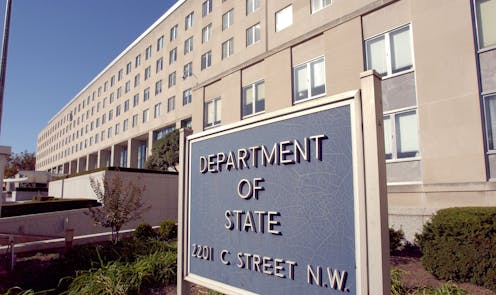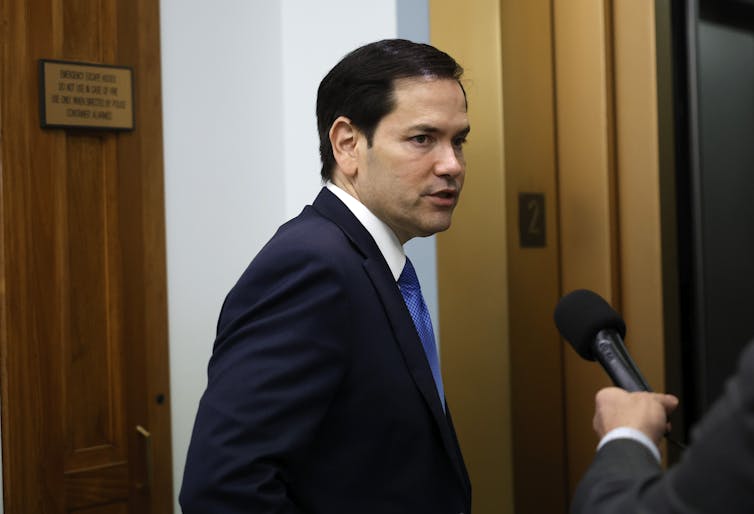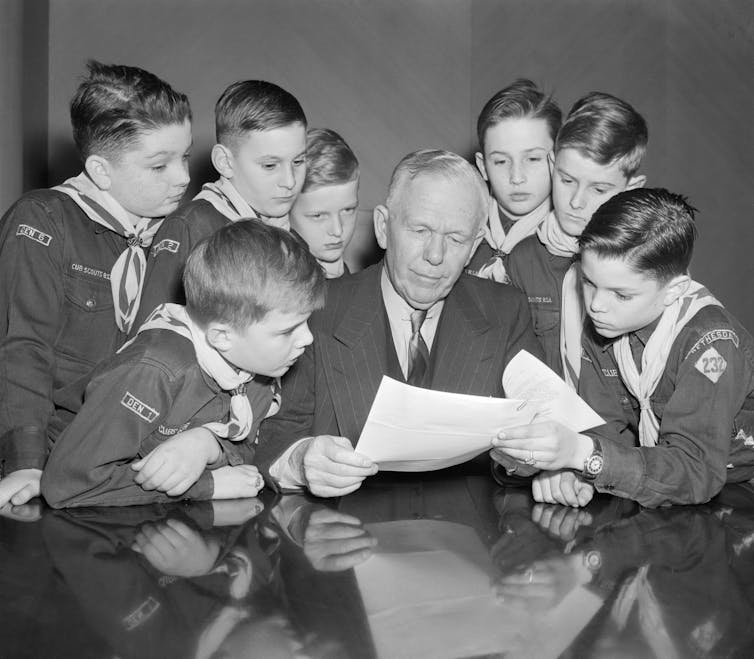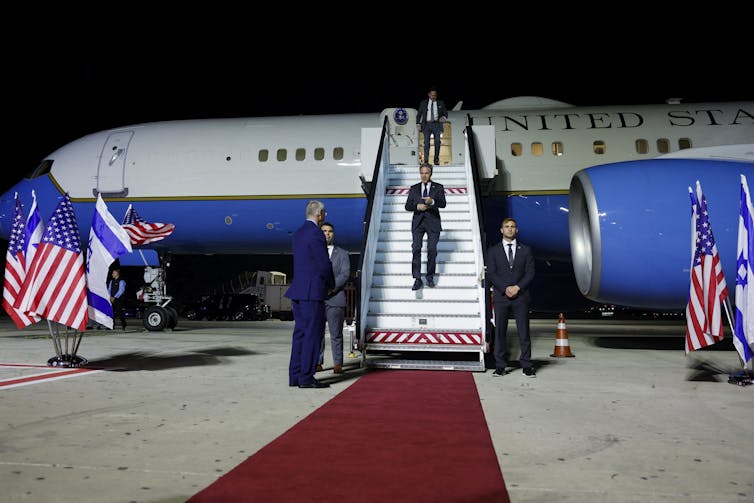US secretary of state has an expansive job that could make or break peace deals and key foreign alliances
- Written by Monica Duffy Toft, Professor of International Politics and Director of the Center for Strategic Studies, The Fletcher School, Tufts University
 The secretary of state wears several hats, including managing the day-to-day at the U.S. Department of State.Greg Mathieson/Mai/Getty Images
The secretary of state wears several hats, including managing the day-to-day at the U.S. Department of State.Greg Mathieson/Mai/Getty ImagesU.S. Sen. Marco Rubio of Florida, Donald Trump’s nominee for secretary of state, will testify before the U.S. Senate Foreign Relations Committee as part of his confirmation process on Jan. 15, 2025.
Rubio’s nomination is remarkable for several reasons, including the fact that Rubio has been a harsh critic of Trump.
But the relationship between Trump and Rubio has improved in recent years, so much so that Rubio was a finalist to serve as Trump’s running mate in 2024. Rubio would also be the first Latino to serve in this important role.
The secretary of state is one of the most important U.S. government Cabinet positions, and the secretary of state is fourth in line for the presidency.
In my work as a scholar of international affairs, I’ve seen how secretaries of state have had lasting impact on U.S. foreign policy and how the rest of the world perceives the U.S.
 Marco Rubio, Donald Trump’s nominee for secretary of state, speaks to reporters in Washington, D.C., in December 2024.Kevin Dietsch/Getty Images
Marco Rubio, Donald Trump’s nominee for secretary of state, speaks to reporters in Washington, D.C., in December 2024.Kevin Dietsch/Getty ImagesSecretaries of state who left their mark
Thomas Jefferson, who served as the first U.S. secretary of state from 1790 through 1793, laid the groundwork for U.S. diplomacy. He helped establish the U.S. as a sovereign country and advocated for neutrality during European conflicts. This allowed the nascent nation to develop its interests without foreign entanglements.
Jefferson also advocated for diplomacy over war and thought that negotiations should be used to resolve conflict. Jefferson wrote in a 1799 letter, “I am for free commerce with all nations, political connection with none, & little or no diplomatic establishment: and I am not for linking ourselves, by new treaties with the quarrels of Europe, entering that field of slaughter to preserve their balance.”
Centuries later, World War II elevated another secretary of state, George C. Marshall, who served from January 1947 through January 1949.
Marshall designed the strategy – aptly called the Marshall Plan – that rebuilt and stabilized Europe after World War II, blunting communism’s spread and solidifying an alliance between a Western bloc of countries. As a result of his work, Marshall received the Nobel Peace Prize in 1953.
 U.S. Secretary of State George Marshall presents Cub Scouts with a ‘Junior Marshall Plan’ in February 1948.Bettmann/Contributor
U.S. Secretary of State George Marshall presents Cub Scouts with a ‘Junior Marshall Plan’ in February 1948.Bettmann/ContributorThe incoming secretary of state in 2025 will face critical challenges, including multiple wars across the world, as well as the potential threat of a nuclear confrontation with Iran or other countries.
This tough job demands significant intelligence, knowledge and grit.
The role of the secretary of state
Above all, the secretary of state is the country’s top diplomat. The secretary oversees and implements all of the president’s foreign policies through the State Department, which includes several agencies, including the Foreign Service.
The secretary of state is also the president’s top adviser on foreign policy. The secretary gives the president updates and recommendations on how a foreign policy decision might be tackled.
The secretary also regularly speaks with different heads of state, ambassadors and foreign ministers to deal with global challenges and crises, and to negotiate international treaties or ceasefire deals.
A day in the life
On a day-to-day basis, the secretary oversees a large bureaucracy, with over 69,000 employees, including ambassadors, foreign service officers and other workers stationed in more than 270 embassies, consulates and missions worldwide.
The secretary’s daily schedule might include morning meetings and updates from senior officials, intelligence agencies or regional experts on ongoing crises. In Washington, D.C., the secretary will also host or attend meetings with ambassadors and foreign dignitaries or with leaders from Congress.
The secretary also reviews budgets, personnel decisions and the many reports that U.S. embassies and other offices overseas produce about the political situations in other countries and regions.
The secretary of state is charged with resolving global conflicts and helping maintain peace. This involves frequent travel abroad to meet with various foreign counterparts.
Secretary of State Antony Blinken, for example, traveled in February and March 2024 to Saudi Arabia, Egypt, Qatar, the West Bank, Israel, Albania, Germany, Brazil, Argentina, Jamaica, Austria, South Korea and the Philippines.
 U.S. Secretary of State Antony Blinken disembarks from a plane at Ben Gurion Airport near Tel Aviv, Israel, on April 30, 2024.Evelyn Hockstein/POOL/AFP via Getty Images
U.S. Secretary of State Antony Blinken disembarks from a plane at Ben Gurion Airport near Tel Aviv, Israel, on April 30, 2024.Evelyn Hockstein/POOL/AFP via Getty ImagesBudget monitoring, too
Not all of the secretary’s work is glamorous or exciting.
Since the secretary of state oversees the State Department, this person must carefully monitor budgets to help ensure that the correct amount of money from the department’s large budget – currently at US$58.8 billion for July 2024 through June 2025 – reaches the various U.S. diplomatic and foreign aid missions.
The secretary also needs to understand and make sure the U.S. lives up to its obligations under different international agreements, such as arms control treaties and trade deals. The secretary is involved in negotiating agreements that come out of international organizations, such as the United Nations and the North Atlantic Treaty Organization.
Another crucial but less high-profile role for the secretary of state is protecting U.S. citizens abroad. The State Department helps U.S. citizens living or traveling abroad with issues ranging from renewing passports and visas to helping them evacuate due to a medical emergency.
The State Department also helps U.S. citizens who experience a natural disaster, political unrest or a kidnapping abroad.
Finally, the secretary must navigate and balance international expectations of how the U.S should respond to escalating conflicts in other countries. At the same time, the secretary has to balance domestic U.S. political considerations.
Why experience matters
The secretary of state takes the lead on responding to crises, from humanitarian disasters to foreign cyberattacks, which can escalate quickly. It is essential to have someone in this post who has crisis management experience, a clear understanding of global politics and history, and strong decision-making skills.
An adept secretary can build bipartisan support and effectively communicate the importance of foreign policy decisions to the public. Lack of political acumen can lead to gridlock or undermine initiatives the U.S. wants to undertake.
If a secretary of state is inexperienced or has poor judgment, it could also exacerbate crises or lead to long-term damage for the U.S.’s national security and its relationships with other countries.
This story is part of a series of profiles of Cabinet and high-level administration positions.
Monica Duffy Toft does not work for, consult, own shares in or receive funding from any company or organization that would benefit from this article, and has disclosed no relevant affiliations beyond their academic appointment.
Authors: Monica Duffy Toft, Professor of International Politics and Director of the Center for Strategic Studies, The Fletcher School, Tufts University

